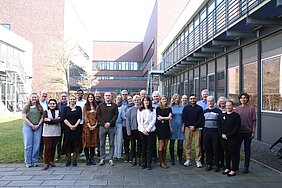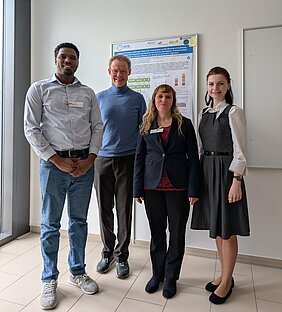The “silent pandemic” of antibiotic resistance was recently the focus of the symposium “Antimicrobial Resistance: The Silent Pandemic”, organized by the Leibniz Research Alliance INFECTIONS. Scientists from our working group “Infections and Antimicrobial Resistance (AMR) in Livestock Farming” actively participated in the two-day event and contributed to the important discussions with their current research results.
The symposium provided a platform for an interdisciplinary exchange on the diverse aspects of antibiotic resistance – from microbiological basics to political and economic dimensions and the challenges associated with them. The Leibniz Research Alliance INFECTIONS is making a decisive contribution to overcoming this global challenge by addressing the transmission of infectious diseases with a particular focus on the spread of antibiotic-resistant microbes.
Research insights from ATB
Megarsa Jaleta, doctoral candiate at ATB, presented current findings on the occurrence of antibiotic resistance in livestock farming. His research showed an astonishing variability of antibiotic resistance between individual animals within the same husbandry conditions (same origin, age, race and identical living conditions). Furthermore, Jaleta investigated the influence of improved hygiene measures in the barn on the reduction of antimicrobial resistance (AMR). Surprisingly, intensified hygiene did not lead to a significant reduction in antibiotic resistance. This finding indicates that if hygiene is already very good, other factors play a greater role in the spread of AMR in the barn.
Aleksandra Atanasova, doctoral candidate at ATB, presented a poster that looked at the influence of temperature and the carbon-nitrogen ratio (C/N ratio) on the survival of AMR bacteria in chicken manure during biogas production, as antimicrobial resistant bacteria are reduced during this process. In addition, the doctoral student identified resistance genes present in the chicken manure that mediate AMR. Her research provides important information on how biogas production can affect the spread of antibiotic resistance - or how it can reduce it - in agricultural residues.
Focus on One Health
Both ATB research projects follow the One Health approach, which considers human, animal and environmental health to be interlinked. The aim of the work is to reduce the spread of antibiotic resistance in animal husbandry and thus also to minimize the risk of transmission to the environment and ultimately to humans.
Participation in the symposium “Antimicrobial Resistance: The Silent Pandemic” was a valuable contribution to scientific discourse for our researchers and provided numerous impulses for further work in the field of antibiotic resistance research.


